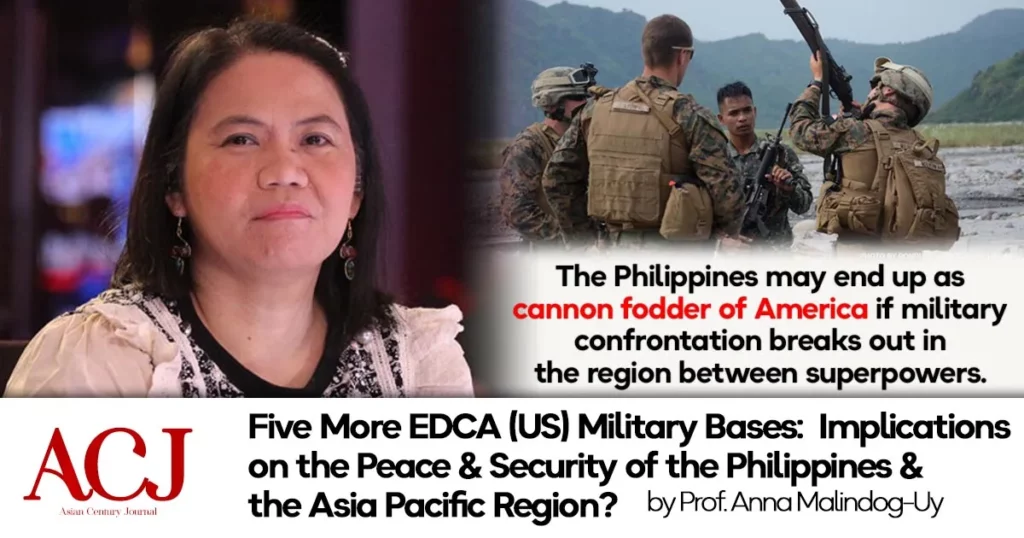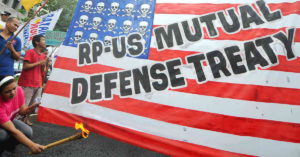
A changing and evolving global order from a unipolar world to a multipolar one is fast approaching and forthcoming.
The unipolar world that was predominantly unchallengedly led by the United States (US) for several decades is becoming a thing of the past every passing day.
The rise of new centers of power, particularly the BRICS countries, like Brazil, Russia, India, and China, and the decline of US unipolarity foster a return to a multi-polar international system.
Hence, the Philippines, as a middle power and its foreign policy, has to adjust to the emerging multipolar world to meet head-on both the opportunities and challenges brought by the impending shift in the global order.
In as far as this is concerned, the independent foreign policy set forth by Former President Rodrigo Duterte and embraced by the incumbent President Ferdinand “Bongbong” Marcos Jr., is thus far, from my vantage point, the most pragmatic course of action given the evolving geopolitical dynamics and realities the country is confronted with.
In similar terms to the previous administration, the independent foreign policy of the new administration should be characterized by pragmatism and based on the backdrop that the country is a friend to all and an enemy to none. This means the Philippines engages with all major powers, particularly the US and China, while maintaining close, cooperative, and friendly relations with countries in the Asia Pacific region and the rest of the world while prioritizing the country’s supreme national interests above all else.
Without a doubt, the Philippines must pursue a genuine and authentic independent foreign policy in every sense, which would mean complete neutrality and positioning itself as non-aligned. This could be done by downgrading or abrogating the Enhanced Defense Cooperation Agreement (EDCA), Visiting Forces Agreement (VFA), and the Mutual Defense Treaty (MDT) with the United States. This means “rejecting outright alignment with the US and not giving -into the lobby of the US to install and establish five more EDCA or US military bases in the country, which is analogous to militarizing the Philippines.
To note, currently, the country is hosting US military facilities or bases and soldiers because of EDCA and the VFA.
But take note, the Philippines has no control over these EDCA or US military bases. Even the Philippine President, if I am not mistaken, is not allowed to inspect US military facilities.
At the moment, there are five US or EDCA military bases across the Philippines, namely Subic Bay Naval Base, Basa Air Base, Fort Magsaysay, Antonio Bautista Air Base, Mactan-Benito Ebuen Air Base, and Lumbia Air Base, which are located for US purposes. They are near or on the South China Sea, significantly enhancing the US military’s ability to challenge Beijing.
Now, if these EDCA bases are further open to US military assets and forces, and if an additional five more EDCA or US military bases will be installed in the country by the Americans, the Philippines, since it is situated in a very strategic position geopolitically speaking in the Asia Pacific region, may end up as cannon fodder of America if military confrontation breaks out in the region between superpowers. If this happens, the national survival and security of the country will be undermined and compromised.
Worst, these EDCA military bases in the country will become prime targets for retaliation or attacks because of US military assets and the presence of boots on the ground. I guess we don’t want a repeat of history, particularly what happened during World War II.
Lessons from History
To note, the country was invaded by Japan not because it was at war with Japan. The country was invaded by Japan precisely because it was home to the largest US military installation outside America. Consequently, the Philippines became a battleground of the war between Japan and the US. Hence, as a nation, we should learn from history and not repeat past mistakes.
Thus, the possibility that the Philippines will further open its military facilities to the US and possibly install five more EDCA or US military bases in the country is somewhat bothersome.
Opening the country’s military facilities to the United States and allowing five more EDCA or US military bases for whatever reason is a dangerous game and path that the Philippines and its leaders must contemplate seriously.
If, in any case, this happens, the country practically becomes the unfortunate US strategic security and defense outpost and the launchpad for the US security and military operations in the Indo-Pacific region. This is worrisome, especially if a war or military confrontation in the Indo-Pacific region breaks out between superpowers involving the US.
Thus, the new administration under the leadership of President Ferdinand “Bongbong” Marcos Jr. must assess and look into these matters with much prudence and reservation.
Likewise, the current administration must consider that the 1987 Constitution prohibits the existence of foreign military bases and troops in Philippine territory.
Moreover, Filipinos should also reflect if the Philippines still need a military treaty with the United States. The original rationale behind the crafting of the MDT, the mother treaty of EDCA, and the VFA were to guard against a rearmed Japan after World War II, with the Soviet Union as the convenient secondary threat because of the Cold War. But such threats are gone now. Thus, it begs to ask if there’s still a need for an MDT.
Furthermore, the existing Philippine-US MDT, EDCA, and VFA have a lot of infirmities, lopsided and skewed provisions favorable more to the US than to the Philippines that need to be revisited and reassessed. Before discussing or even before we entertain the lobby of the US for five more additional EDCA bases, we should reconsider, review and reassess first the merits and demerits of EDCA, VFA, and the MDT.
Conclusion
In retrospect, as a country, we should have a firm resolve and tenacity to deviate from the “colonial mentality” of being subservient to the US, veering away from being used as a pawn in the US hardline policy and posture against China, which if not tempered and moderated will only lead to horrendous misadventure and tragedy.
Furthermore, it is high time for the Philippines to take hold of its fate and destiny as a country rather than relying on other countries for its development, progress, and even security survival amid the geopolitical tensions and realities affecting the Indo-Pacific region and the world at large.
The Philippines can relate with other countries and the entire international community based on mutual trust, understanding, confidence, and equal footing. To do that, the Philippines must pursue a meaningful independent foreign policy that upholds and prioritizes its supreme national interests. It must stand not subservient to the will and caprices of any superpower.
Regionally, the Philippines should continue to assert ASEAN centrality, which means unity and solidarity with neighboring countries in Southeast Asia. It should continue to forge good relations with the rest of Asian countries. And it should continue to pursue good relations with major powers like China and the US and with the “middle powers” like Russia, Japan, Brazil, India, the EU, Australia, and the like.
The Philippines should continue to exercise MULTILATERIALISM and DIPLOMACY as its primary weapons in international relations while strengthening its deterrence capacity, relying on its strength and capability as much as possible.
Indeed, it is high time for the Philippines and the Filipino people to craft their path and course of action advantageous to themselves with dignity and a sense of pride as a country and as a people. I believe this is the way forward.
Source: Asian Century Journal
https://asiancenturyph.com/2022/11/16/five-more-edca-us-military-bases-implications-on-the-peace-security-of-the-philippines-the-asia-pacific-region/


